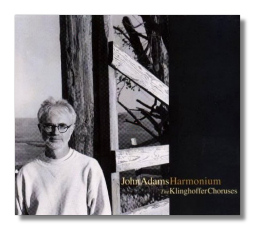
The Internet's Premier Classical Music Source
Related Links
- Adams Reviews
- Latest Reviews
- More Reviews
-
By Composer
-
Collections
DVD & Blu-ray
Books
Concert Reviews
Articles/Interviews
Software
Audio
Search Amazon
Recommended Links
Site News
 CD Review
CD Review
John Adams

Harmonium
- Harmonium
- The Death of Klinghoffer: 6 Choruses
San Francisco Symphony Chorus
San Francisco Symphony Orchestra/John Adams
London Opera Chorus
Orchestra of the Opéra de Lyon/Kent Nagano
Nonesuch 79549-2 DDD 73:31
Harmonium is twenty years old, but already it has found a large audience since its San Francisco première in April 1981. It has also received at least two major recordings prior to this one – remarkable, because the work requires an orchestra and a chorus (expensive!) even though it is only about a half-hour long.
The composer himself conducts this new recording. Dating from 1997, it originally appeared in the John Adams Earbox, a retrospective of his music (Nonesuch 79453-2, 10 discs). Adams is no Johnny-come-lately to conducting; while he was still in high school, he studied it at Dartmouth College in the summers, and he conducted student orchestras and opera productions while he was an undergraduate at Harvard. His work with other composers' music is at least as thoughtful as his compositions are. The buzz from outside of the United States is that Adams's recording of Ives' Fourth Symphony with the Ensemble Modern of Germany is the best there is. (Unfortunately, this recording is on the EM's own label, which does not seem to be readily available in the United States. Check their website.)
Harmonium has been recorded by Edo de Waart (ECM) and Robert Shaw (Telarc). De Waart's performance, good as it is, takes third place, and ECM offers nothing to the listener other than the 32 minutes of this admittedly incredible work. Shaw's version has Rachmaninoff's The Bells as its unintuitive but imaginative coupling. Adams takes faster tempos than either Shaw or De Waart. The interpretation is unsentimental but even more unsettling than Shaw's. Predictably, Shaw can't quite put the beauty of choral sound for the sake of beauty aside. Adams takes it for granted, and so the focus of this recording is the music, not the precision of the musicians.
Nonesuch released the complete Death of Klinghoffer in 1992 (Nonesuch 79281-2, 2 discs) and it still is in print. The Earbox offered a full CD of extracts from this opera; the present CD offers six choruses. Adams has compared the opera to one of Bach's Passions, and just as the St. John Passion (for example) rises and falls on the swell of its choruses, so does Klinghoffer. It makes sense, then, to offer these six choruses as a freestanding unit. They contain some of the opera's best music, and they remain satisfying out of context. The choruses compare and contrast Jews and Palestinians, day and night, and ocean and desert, and the musical contrasts within are equally dramatic. Nagano conducts imposingly.
Praise must be given to the chorus directors too. They are Vance George (Harmonium) and Richard Cooke (Klinghoffer).
Copyright © 2000, Raymond Tuttle




















